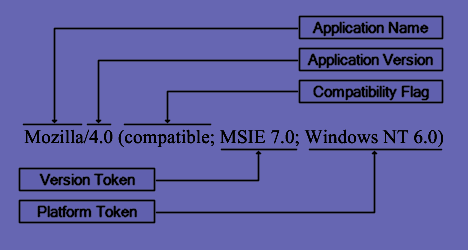Related articles
Explaining User-Agent Strings
This article about
Internet Explorer (MSIE) user-agent string, which identifies your browser and provides certain system details to servers hosting Web sites you visit.
Introduction
When you visit a Web page, your browser sends user-agent header string to server of page that you opening.
This string contain info about what browser you using, its version number, and details about your system, such as operating system and version.

The MSIE user-agent request header contains three parts.
- Compatibility flag ("compatible") is used by most modern browsers (GoogleBot and Yahoo slur for example). It indicates that Internet Explorer is compatible with a common set of features.
- Version name of browser and contains version number. version name of browser ("MSIE 6.0") identifies Internet Explorer 6.
- Platform contain info your operating system and contains version number. platform token in example ("Windows NT 5.1") indicates Windows XP.
| Version token | Description |
|---|
| MSIE 8.0 | Internet Explorer 8 (pre-release) |
| MSIE 7.0 | Internet Explorer 7 |
| MSIE 7.0b | Internet Explorer 7 (Beta 1 pre-release only) |
| MSIE 6.0 | Microsoft Internet Explorer 6 |
| MSIE 6.0b | Internet Explorer 6 (pre-release) |
| MSIE 5.5 | Internet Explorer 5.5 |
| MSIE 5.01 | Internet Explorer 5.01 |
| MSIE 5.0 | Internet Explorer 5 |
| MSIE 5.0b1 | Internet Explorer 5 (pre-release) |
| MSIE 4.01 | Internet Explorer 4.01 |
Platform tokens describe your operating system. following table lists Internet Explorer platform tokens for last several versions of Windows.
| Platform token | Description |
|---|
| Windows NT 6.0 | Windows Vista |
| Windows NT 5.2 | Windows Server 2003; Windows XP x64 Edition |
| Windows NT 5.1 | Windows XP |
| Windows NT 5.01 | Windows 2000, Service Pack 1 (SP1) |
| Windows NT 5.0 | Windows 2000 |
| Windows NT 4.0 | Microsoft Windows NT 4.0 |
| Windows 98; Win 9x 4.90 | Windows Millennium Edition (Windows Me) |
| Windows 98 | Windows 98 |
| Windows 95 | Windows 95 |
| Windows CE | Windows CE |
Certain optional components can also modify user-agent string (add some it's record, for example "InfoPath.1; Alexa Toolbar");
the following table shows common ones. Need to know that many other applications also modify user-agent string.
Because of this, a comprehensive list is not possible. If you find additional tokens in your user-agent string,
you should investigate them in more detail.
| Token | Description |
|---|
| .NET CLR | .NET Framework common language run time, followed by version number. |
| SV1 | Internet Explorer 6 with enhanced security features (Windows XP SP2 and Windows Server 2003 only). |
| Tablet PC | Tablet services are installed; number indicates version number. |
| Win64; IA64 | System has a 64-bit processor (Intel). |
| Win64; x64 | System has a 64-bit processor (AMD). |
| WOW64 | A 32-bit version of Internet Explorer is running on a 64-bit processor. |
Examples:
"Mozilla/4.0 (compatible; MSIE 6.0; Windows NT 5.1; SV1; Alexa Toolbar; mxie; RssFeedEater; .NET CLR 1.1.4322; .NET CLR 2.0.50727)"
"Mozilla/4.0 (compatible; MSIE 6.0; Windows NT 5.1; SV1; .NET CLR 1.1.4322)"
"Mozilla/4.0 (compatible; MSIE 6.0; Windows NT 5.1; SV1; .NET CLR 1.1.4322; .NET CLR 2.0.50727; InfoPath.1)"
"Mozilla/4.0 (compatible; MSIE 6.0; Windows NT 5.1; SV1; .NET CLR 1.0.3705; .NET CLR 1.1.4322; Media Center PC 4.0)"




